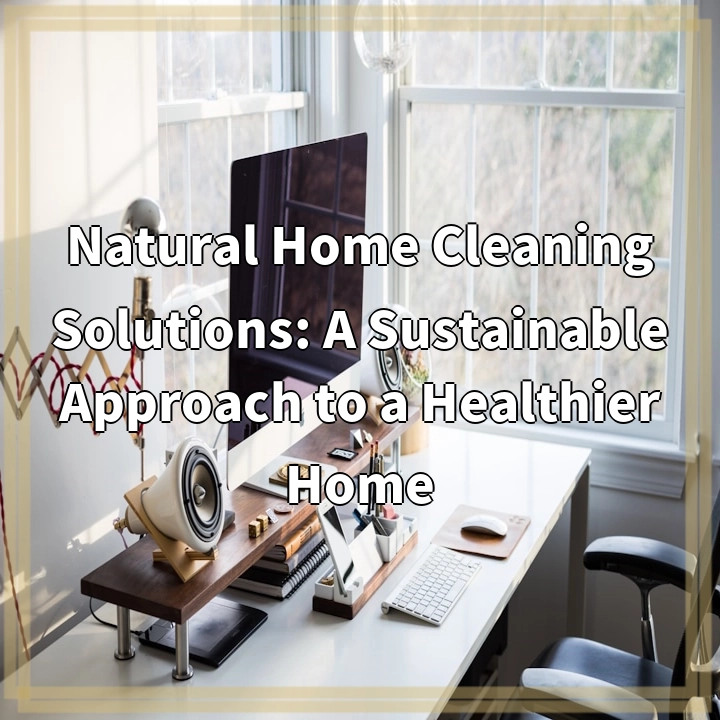
What it is:
Natural home cleaning solutions refer to using environmentally friendly and non-toxic products made from natural ingredients to clean and sanitize household surfaces. Unlike conventional cleaners, which may contain harsh chemicals, these solutions harness the power of natural substances such as vinegar, baking soda, lemon juice, and essential oils. They effectively tackle dirt, grime, and bacteria while being gentle on both the environment and human health.
Benefits of Natural Home Cleaning Solutions
One of the primary advantages of natural home cleaning solutions is their safety profile. Many conventional cleaning products contain harmful chemicals that can pose risks to human health, especially for children and pets. By opting for natural alternatives, households can reduce their exposure to these toxins. Furthermore, natural cleaners are biodegradable and less likely to pollute water and soil, making them a sustainable choice for eco-conscious consumers.
Common Ingredients
Some popular ingredients in natural cleaning solutions include:
- Vinegar: An effective disinfectant that can cut through grease and remove odors.
- Baking soda: A versatile abrasive that helps scrub surfaces and tackle tough stains.
- Lemon juice: Known for its acidity, lemon juice can eliminate bacteria and leave a fresh scent.
- Essential oils: Natural oils like tea tree, lavender, and eucalyptus provide antimicrobial properties and pleasant fragrances.
Real-World Problems
Despite the benefits of natural home cleaning solutions, there are challenges associated with their adoption. One significant issue is the lack of awareness and misinformation regarding their effectiveness compared to commercial cleaners. Many consumers may be skeptical about whether these natural solutions can deliver the same level of cleanliness and sanitation.
Accessibility and Cost
Another challenge is accessibility. While many natural ingredients are affordable and readily available, not everyone may have the time, knowledge, or resources to create their own cleaning solutions. Some store-bought natural products can also be more expensive than their conventional counterparts, leading to reluctance in switching.
Regulation and Standardization
The natural cleaning product market is not consistently regulated, meaning that not all products marketed as “natural” are necessarily safe or environmentally friendly. This lack of standardization can lead to confusion among consumers trying to make informed choices about the cleaning products they use in their homes.
Environmental Impact of Conventional Cleaners
Lastly, the pervasive use of conventional cleaners contributes to environmental degradation through water pollution and toxic waste. Many traditional products contain phosphates and other harmful substances that, when washed down the drain, can lead to algal blooms and disrupt aquatic ecosystems. Transitioning to natural solutions can significantly mitigate these environmental risks, but it requires collective action and awareness among consumers.

Solutions to Embrace Natural Home Cleaning Solutions
Adopting natural home cleaning solutions can significantly enhance household health and environmental sustainability. Below are some strategies for successfully implementing these eco-friendly cleaning practices in your home.
1. Educate Yourself and Others
Increasing awareness about the effectiveness of natural cleaning solutions is crucial. Share information with family and friends about the benefits of using non-toxic ingredients for a healthier home. Consider hosting workshops or sharing resources online to promote knowledge around natural cleaning methods.
2. DIY Natural Cleaning Recipes
Create your own natural cleaning solutions using common household ingredients. Simple recipes can be formed using vinegar, baking soda, lemon juice, and essential oils. These recipes are often more cost-effective than store-bought products and allow greater control over the ingredients used.
3. Research Before Purchasing
If you prefer store-bought natural cleaning products, take the time to research brands that prioritize safety and sustainability. Look for certifications or labels that indicate eco-friendliness and non-toxicity to ensure that you’re making informed choices.
4. Transition Gradually
If you’re hesitant to switch entirely to natural cleaners, consider a gradual transition. Start by replacing a few conventional products with natural alternatives, assessing their effectiveness before making further changes. This approach can help alleviate concerns and allow for a smoother transition.
5. Advocate for Policy Changes
Support policies and regulations that promote transparency in cleaning product labeling and sustainability. By advocating for change at a community or governmental level, you can contribute to healthier environments and greater availability of natural cleaning solutions.
6. Monitor Environmental Impact
Stay informed about the environmental impacts of cleaning products, whether natural or conventional. Understanding the broader ecological consequences can reinforce your commitment to sustainable practices and inspire continued advocacy for cleaner alternatives.
Conclusion
By educating yourself and others, creating DIY cleaning solutions, conducting thoughtful research, transitioning gradually, advocating for policy change, and monitoring environmental impacts, you can effectively incorporate natural home cleaning solutions into your lifestyle. These steps not only contribute to a healthier home but also foster a more sustainable relationship with the environment.















